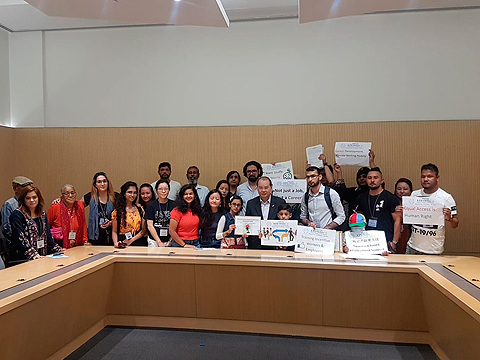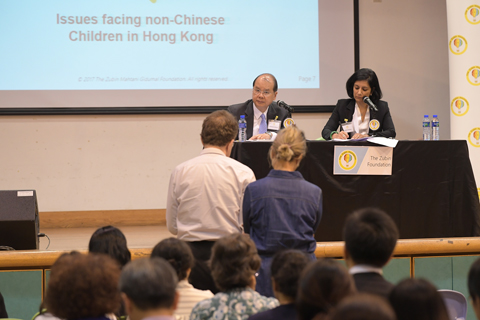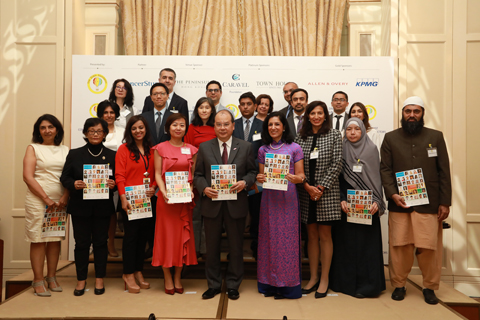We are all Hongkongers
28 October 2018
 |
Equality and inclusiveness is not a mere slogan. It represents a core value of Hong Kong.
At present, about 263 000 people (excluding foreign domestic helpers) or roughly 3.8% of the city's population are ethnic minorities, and about 80 000 of them are of South Asian origin. Many of them were born and bred in Hong Kong, with their parents or even grandparents having settled here decades ago. However, owing to language barriers and cultural differences, some of them still encounter challenges in integrating into society.
Mindful of that, the Government set up in mid-2018 the Steering Committee on Ethnic Minorities Affairs under my chairmanship to enhance cross-bureau collaboration, and co-ordinate, review and monitor work in this area, with a view to providing more effective support for ethnic minorities.
In the months since then, I have had numerous exchanges with ethnic minority organisations, service providers and stakeholders to listen to their views. The series of new measures presented in the newly released Policy Address covering education, employment, social welfare and social integration aim to cater for the diverse needs of ethnic minorities, quite a number of which were developed from ideas and suggestions raised by them.
 |
First of all, in the area of education, ethnic minorities generally find it very difficult to learn the Chinese language. However, the ability to read and write Chinese is pivotal in their employment and social integration. In this regard, the Government actively encourages and supports non-Chinese speaking (NCS) students to adapt to the local education system and acquire proficiency in Chinese.
The Policy Address sets out the enhanced support for the Chinese language learning of NCS students. Besides carrying on with the "Chinese Language Curriculum Second Language Learning Framework", the Government will allocate more resources to commission post-secondary institutions to provide school-based professional support services for kindergartens, primary and secondary schools admitting NCS students in the three school years from 2019/20 to 2021/22 to enable NCS students to learn Chinese more effectively.
The earlier we provide young NCS children with appropriate support for Chinese learning, the more effective it will be. Regarding financial assistance for kindergartens admitting NCS students, starting from the 2019/20 school year, there will be a five-tiered subsidy for kindergartens joining the Kindergarten Education Scheme based on the number of NCS students admitted. This will replace the original flat-rate subsidy provided for kindergartens with eight or more NCS students, so as to further enhance support for NCS students in kindergartens. Under the proposed new arrangement, a kindergarten with 31 or more NCS students will enjoy a maximum subsidy double the existing rate. In addition, for public sector ordinary schools admitting NCS students with special educational needs, we will introduce a new grant under a three-tiered structure according to the number of such students admitted, with a view to helping the students adapt to and cope with different learning stages.
Apart from that, ethnic minorities may also face difficulties in job seeking. While Hong Kong is approaching full employment, some ethnic minority people say that despite their academic qualifications, they have limited choices in work and hence less upward mobility owing to limited proficiency in Chinese.
In the Policy Address, we propose to increase manpower of the Labour Department to launch a pilot programme in conjunction with non-governmental organisations (NGOs) to provide employment services for ethnic minority job seekers through a case management approach so as to utilise NGOs' community network, expertise in case management and experience in serving ethnic minorities.
 |
The Employees Retraining Board has offered 41 English-taught courses catering for ethnic minorities in 2018-19. The Policy Address proposes to expand the range of dedicated language and industry-specific training courses provided by the Employees Retraining Board, and allow more flexibility in the educational attainment criteria for enrolment in dedicated Chinese language courses.
As the biggest employer in Hong Kong, the Government is committed to promoting social integration through giving ethnic minorities fair access to government jobs. Subsequent to a thorough review, 53 grades have lowered/will lower their Chinese language proficiency requirement. We will review the Chinese language proficiency requirements of civil service grades on an ongoing basis. Besides, the disciplined services will step up recruitment and outreaching efforts to encourage ethnic minorities to join them.
Moreover, next year we will introduce a short-term internship programme within the Government for ethnic minority university students on a pilot basis to enable them to gain work experience and strengthen their competitiveness in job seeking.
Meanwhile, we are aware that some ethnic minority people fail to access mainstream welfare services because of the lack of community connections. We will commission NGOs to set up district outreaching teams to proactively reach out to ethnic minority families and understand their situation and needs with a view to referring them to suitable services and support where necessary. To facilitate their access to public services, we will enhance the interpretation services at the Centre for Harmony and Enhancement of Ethnic Minority Residents (CHEER).
The Government strives to build an inclusive and caring society, where people of all origins call it home. We will strengthen cultural sensitivity/equal opportunities training for the civil servants, especially new recruits and frontline staff. We will also review and refine the Administrative Guidelines on Promotion of Racial Equality to ensure their application to all government bureaux, departments and related organisations providing services for ethnic minorities. In tandem, we will strengthen the services of support service centres for ethnic minorities and organise more activities conducive to interaction and exchange between the ethnic minority and local communities.
The Government has earmarked more than $500 million to implement the above measures to strengthen support for ethnic minorities starting from 2019-20. While continuing to enhance support for ethnic minorities to demonstrate our commitment, we also endeavour to promote community-business-government collaboration in helping the disadvantaged. I call on all sectors of society to work together to better support ethnic minorities and build an inclusive and harmonious Hong Kong.

